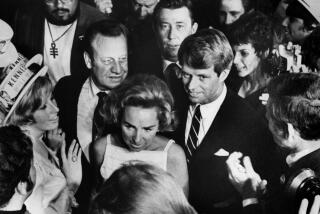Can’t We Redefine the Perfect Political Wife?
Two stories about First Ladies in the newspaper last week brought home how the role of the President’s wife has changed in the last two decades--and our deep ambivalence about the job.
On the same day we read about the death of Pat Nixon--the “perfect political wife”--we learned the courts had ruled that Hillary Rodham Clinton is a “de facto” government employee, and as such, is not required to invite the public to meetings of her health care task force.
In obituaries, Mrs. Nixon was described as loyal and long-suffering. In news stories, Mrs. Clinton was described as having attained a victory; one report said the federal appeals court had “acquiesced in Mrs. Clinton’s ambitious views about the role and powers of the First Lady.”
The timing of these two news events makes it impossible not to compare the styles of these extraordinarily different American political wives.
People seemed to react to the headlines about Mrs. Nixon the way they would to an ink blot: Those who considered her the ideal First Lady read something sinister into descriptions of how she is the last of her breed. To their way of thinking, there is an implicit message that Mrs. Clinton is behaving the way First Ladies should.
Those who applaud Mrs. Clinton’s more involved style seem to read the homages to Mrs. Nixon as an implicit criticism of Mrs. Clinton.
All interpretations point to the continuing confusion in this country over what we expect from First Ladies.
*
On Friday, a long line of people stood in the hot afternoon sun, waiting to pay their last respects to Mrs. Nixon. Surrounded by immense floral arrangements, flanked by a Marine honor guard, her body lay in a lacquered coffin under a spray of white and yellow roses inside the Richard Nixon Library & Birthplace in Yorba Linda.
Most mourners said similar things about Mrs. Nixon: She was quiet and strong, like iron, a great lady, patriotic, private, hurt. She was a wife from that era, they said; she suffered in silence.
Some were offended when asked to reflect on how the styles of First Ladies have changed, on how Mrs. Nixon compares to Mrs. Clinton: “Their names shouldn’t be used in the same sentence,” said a woman who walked precincts for the GOP in 1968, the year Richard Nixon was first elected President.
Bruce Herschensohn, who worked in the Nixon White House, puffed on a cigarette outside the library and reflected on the sentiment underlying the newspaper headlines and stories proclaiming the passing of an era with the death of Mrs. Nixon.
“When people say it is the end of that school of First Ladies,” he said, “I think they are saying that how it is now is how it should be. And I could not disagree with that more. I think First Ladies should be like Denis Thatcher was when the cabinet came to call--invisible.”
Just after I spoke with Herschensohn, a library employee handed me a press kit. It contained a list of “notables” expected to attend Mrs. Nixon’s private funeral service the following day.
“ Accompanying wives, etc., “ it said, “ not necessarily noted. “
*
My guess is that Pat Nixon, who was 81 when she died last week of lung cancer, spent a good portion of her life being “not necessarily noted” for the things she did. (She was noted, however, for the things she wore--most dramatically, the “respectable, Republican cloth coat” her husband described in his famous “Checkers” speech during the 1952 presidential campaign.)
I was surprised to read in Julie Nixon Eisenhower’s 1986 biography of her mother that Mrs. Nixon was deeply disappointed in 1971 when her husband did not nominate a woman to one of the two vacant spots on the Supreme Court. She also supported the Equal Rights Amendment, and had spent 16 years working, quitting when her first child, Tricia, was born.
Still, despite some feminist stirrings, Mrs. Nixon never had a cause higher than her husband. She once said (and there is no reason to assume she changed her view): “A wife’s first duty is to help and encourage her husband in the career he has chosen.”
When you think of Barbara Bush, you think of literacy; when you think of Nancy Reagan, you think of drug abuse prevention.
When you think of Pat Nixon, you think of Richard Nixon.
And when you think of Richard Nixon, you think of Watergate.
“Few women in public life have suffered as she has suffered and done it with such grace,” said the Rev. Billy Graham at Mrs. Nixon’s memorial service Saturday.
The era of the long-suffering political wife, I hope, has come to a close. I say this in no way to disparage Pat Nixon, but to recognize that for many women who find themselves grappling with the demands of public and private life, Hillary Clinton’s example may prove the more liberating one.
More to Read
Get the L.A. Times Politics newsletter
Deeply reported insights into legislation, politics and policy from Sacramento, Washington and beyond. In your inbox three times per week.
You may occasionally receive promotional content from the Los Angeles Times.











